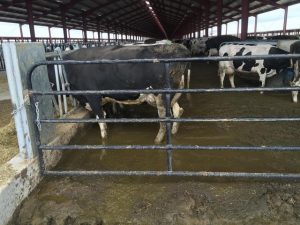Farm Aid advocates for change in the food and farm system and builds the grassroots power needed to advance transformative change. In order to do this, we:
- Invest in grassroots leaders who work to change the food and farm system;
- Partner with family farmers and grassroots organizations to build power;
- Convene strategic meetings, conferences, and events that strengthen our movement;
- Utilize Farm Aid’s unique voice and reach to inform the public;
- Elevate the voices and stories of family farmers, leaders and partner organizations;
- Engage the public in advocacy campaigns on key policy issues to leverage big changes; and
- Influence policymakers, business leaders and other key influencers to support family farmers.
With devastating weather, low prices and harmful farm and trade policies, America’s family farmers faced immense challenges to hold on to their farms in 2019. Farm Aid devoted expanded time and effort to elevating the profile of the crisis and its root causes, as well as the resulting rise in stress and mental health challenges among farmers. We secured critical funding for the Farm and Ranch Stress Assistance Network, called upon 2020 presidential candidates to fight for fair markets, supported the fight against factory farms, championed farm to school programs across the country, and much more!
Jump to a Section
Major Initiatives
Movement-Building Gatherings
Collaboratives & Coalitions
Sign-Ons
Major Initiatives
Farm Crisis
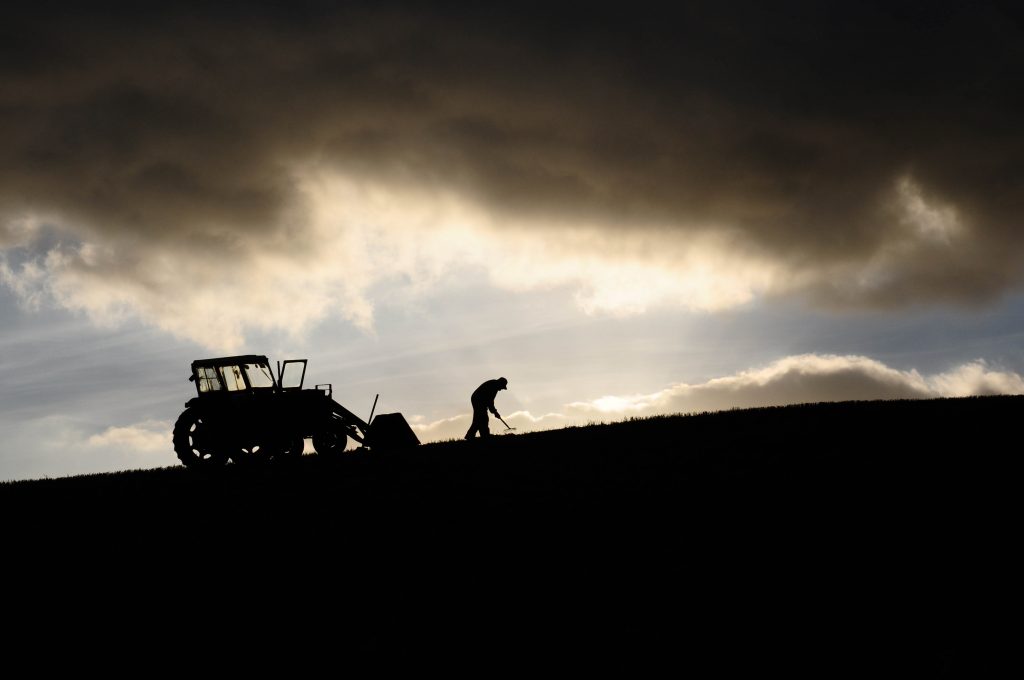
Photo via flickr user EYE DJ (CC BY-NC-ND 2.0)
Issue Communications
Earned Media:
The farm crisis and its impact on mental health and wellbeing among farmers, farm families and rural community members was a major communications priority in 2019. Notable interviews and press mentions included:
- The Farmer’s Mind: How Farm Aid addresses economic and emotional needs of farmers. Psychology Today. February 15
- American Farmers Confront a Mental Health Crisis. Bloomberg News. March 20
- Farms on the Margins: Debt Figures Raise Questions of Whether Farm Debt is on Cruise Control Progressive Farmer. March 19
- In Rural America, Farmers Reap What the President Sows. The American Prospect. April 3
- Amid Trump Tariffs, Farm Bankruptcies And Suicides Rise Forbes. August 30
- Farm Aid was inspired by a farm crisis. Now in its 34th year, it faces another one. NBC News. September 31
- American Farmers are in Crisis. Here’s Why. TIME. November 27
Fact Sheets:
Farm Aid updated Why Farmers Face Unique Threats from Stress, highlighting the unique stressors felt by farmers and solutions to support them and Understanding the Economic Crisis Family Farms are Facing.
FarmYard Briefing at Farm Aid 2019:
At each Farm Aid festival, we host a series of briefings that feature concert artists and farmers who come together to discuss pressing issues in food and agriculture. This year, we dedicated a panel to the issue of farmer stress. Hosted by Pam Jahnke, the Fabulous Farm Babe, this dynamic panel included Margo Price, American Psychological Association’s executive director Dr. Arthur Evans, Randy Roecker, a Wisconsin dairy farmer and mental health advocate, and Dr. Mike Rossmann, a psychologist dedicated to working with the farm population, and farmer himself, based in Iowa.
Farm and Ranch Stress Assistance Network (FRSAN)
In 2018, Farm Aid joined a coalition that advocated for and secured FRSAN’s inclusion in the 2018 Farm Bill and up to $10 million each year until 2023. Congress appropriated $2 million to establish a pilot FRSAN program in FY2019 and Farm Aid was part of a team of organizations awarded a grant to build a FRSAN network in the Northeast. Led by Farm Aid, National Young Farmers Coalition, and Vermont Farm First, this project titled Building an Inclusive and Comprehensive Network for Farm and Ranch Stress Assistance in the Northeast is working to convene a network of farmer service providers, develop an online clearinghouse of resources and referrals with farmers and service providers, and train service providers on available resources and best practices for working with farmers under stress. These efforts will continue into 2021.
Farm Aid also joined several dozen farm and rural organizations, together representing millions of members, in pushing Congress to support full funding for FRSAN in FY2020 Appropriations. We were featured on a Young Farmers Podcast episode with the Washington Young Farmers Coalition and National Farmers Union, which included a text action for listeners to be connected to Members of Congress and demand full funding for FRSAN. The federal FY 2020 budget is still in limbo, but we are hopeful the program will receive the full $10 million in 2020.
Government Shutdown
In December 2018, an impasse between the Trump Administration and Congress over border wall funding spurred a shutdown of the federal government. Early in 2019, Farm Aid’s hotline received more than double its typical call volume. Nearly every call was from a farmer hurt by the shutdown, which compounded the affects of the ongoing farm crisis and arrived at a critical financial window for most farmers. In early January, Farm Aid published a blog post covering this impact. Farm Aid’s hotline offered a rare insight into the shutdown’s unfolding impacts and several media outlets approached us to learn more:
- Farm Country Stood by Trump. But the Shutdown Is Pushing It to Breaking Point. The New York Times. January 10.
- Shutdown comes at a ‘tough time’ to be an American farmer PBS NewsHour. January 14.
- As Trump touts achievements, farmers feel the strain during government shutdown. ABC News. January 15.
- FSA employees face loan processing backlog. Agri-Pulse. January 30.
Other Advocacy
Seeding Rural Resilience Act:
Farm Aid worked with Senator Jon Tester’s office as it drafted a bill to address the growing incidence of stress, depression and suicide in farm populations. In October, Senators Tester and Grassley introduced and Farm Aid endorsed the Seeding Rural Resilience Act, which would implement a voluntary stress management training program at USDA; provide the Department of Health and Human Services and USDA with $3 million to create a PSA campaign bringing awareness to the issue of farmer stress; and direct the Secretary of Agriculture to work with state, local, and nongovernmental stakeholders to determine best practices for responding to farm stress.
Farm Services Agency Programs:
In March, Farm Aid submitted comments to a 2018 Farm Bill Implementation Listening Session on Farm Service Agency (FSA) programs, which are essential sources of farm lending to farmers and ranchers nationwide. We urged USDA to:
- Ensure farm families have the greatest opportunity to stay on their farms, in their homes and to pass their farms on to the next generation;
- Closely monitor available funding levels in all FSA loan programs and work with Congress to assure appropriate funding;
- Ensure that FSA county offices have adequate staffing to implement programs;
- Instruct county offices that programs should be implemented to provide the greatest chance of success possible for farm families;
- Prioritize implementation of FRSAN, the Agricultural Mediation Program, and the Relending Program to Resolve Ownership and Succession on Farmland, which assists farm families in addressing heir property issues;
- Direct county offices to implement the provision of equitable relief in lending programs; and
- Ensure FSA loans access for small and mid-scale farms, new and beginning farmers, socially disadvantaged farmers, and veteran farmers.
2020 Presidential Race
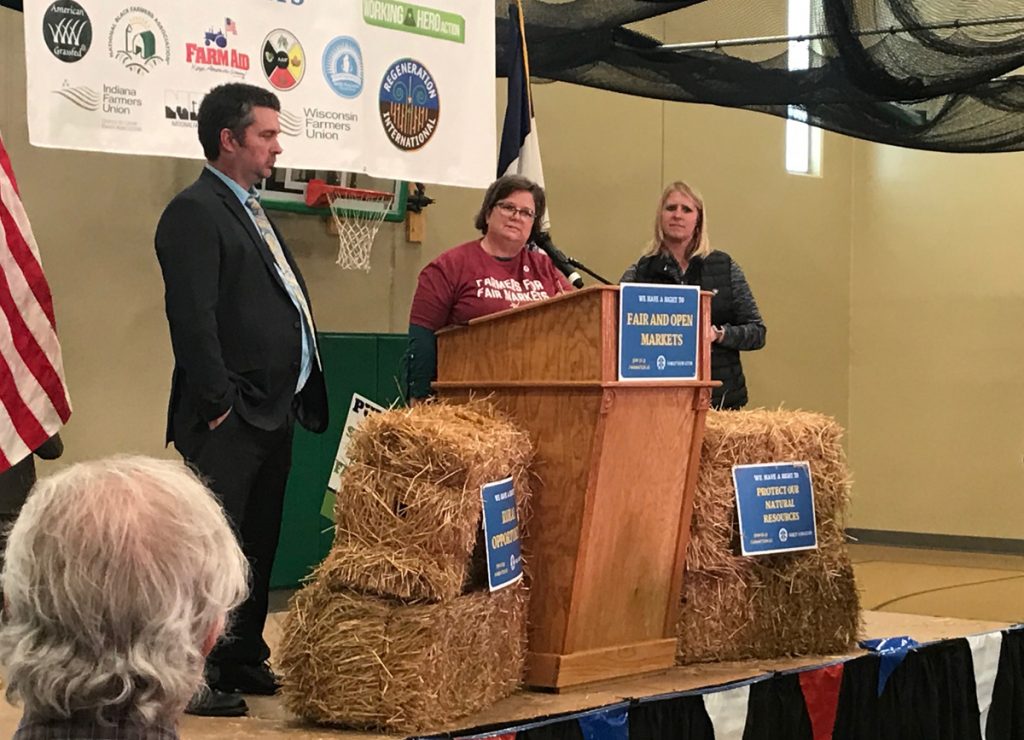
Speakers at the Farmers’ Rights Rally: Greg Gunthorp (Indiana farmer), Sarah Lloyd (Wisconsin Farmers Union), and Patti Edelburg, )National Farmers Union). Photo © Sherri Dugger
The Heartland Forum
On March 30, The Storm Lake Times, Iowa Farmers Union, The Open Markets Action Fund and The Huffington Post organized the Heartland Forum as a conversation dedicated to rural issues in the 2020 presidential race. Art Cullen, Pulitzer-prize winning editor of The Storm Lake Times, moderated the forum along with two journalists from The Huffington Post in an event attended by candidates Senators Elizabeth Warren and Amy Klobuchar, Representatives Tim Ryan and John Delaney, and Secretary Julian Castro.
Farmers’ Rights Rally:
Prior to the forum, Farm Aid sponsored a farmer rally organized by Family Farm Action to call attention to the issues family farmers and rural communities face. Speakers included policy makers, rural activists, farmers and ranchers, and Presidential candidates, who addressed the concerns of family farmers and rural communities and spoke to Family Farm Action’s Farmers Bill of Rights, which Farm Aid endorsed. Farm Aid’s Farmer Leadership Fund offered travel support for farmers to attend the rally.
Notable interviews and press mentions included:
- 2020 Dems’ First Big Iowa Cattle Call Is All About Rural America. Iowa Starting Line. March 18.
- Groups Rally for Farmer Bill of Rights Before Rural Forum. Progressive Farmer. March 30.
- Presidential candidates prodded to articulate ‘vision for rural America’ in Storm Lake, Iowa. Des Moines Register. March 30.
- 2020 Democrats campaign across the US. CNNPolitics. March 30.
- At Iowa forum, Democratic presidential candidates vow to take on Big Ag. FERN’s Ag Insider. March 31.
- Democratic Candidates Call for Antitrust Reform at Heartland Forum in Northwest Iowa. Food and Power. April 2.
- At the Heartland Forum, Presidential Hopefuls Address Rural Ag Issues Head-On. Civil Eats. April 2.
Presidential Candidates Must Commit to Fair Markets for Family Farmers
In June, Farm Aid joined 34 farm and food organizations in calling upon our elected officials, as well as candidates running for office, to ensure a fair marketplace for Americas family farmers and ranchers. The fair markets platform calls on elected officials to:
- Enforce and Strengthen Antitrust and Fair Practice Laws;
- Ensure Fair Farm Credit;
- Restore Mandatory Country-of-Origin Labeling for Beef and Pork;
- Stop Subsidizing Overproduction;
- Break Up Food and Agriculture Monopolies;
- Stop Subsidizing Foreign Corporations; and
- Level the Playing Field for Independent Processors
Fighting Factory Farms
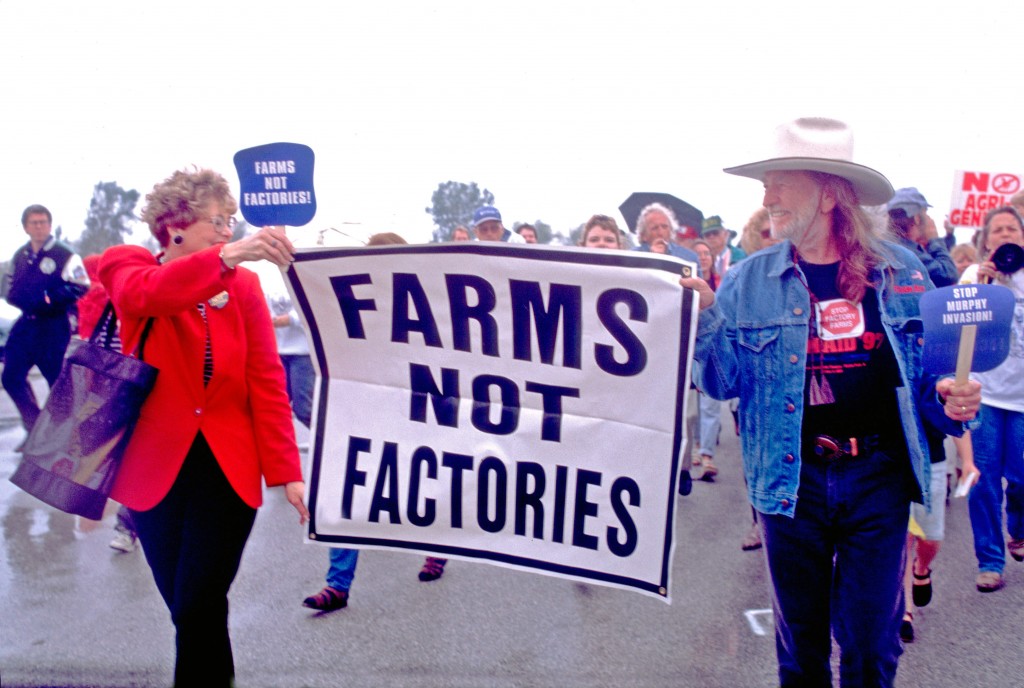
Willie Nelson at a 1997 rally.
Oregon Mega-Dairy Moratorium
Oregon is home to some of the country’s largest factory dairy farms – notably Threemile Canyon Farm, which houses 70,000 cows, and Lost Valley Farm, housing 30,000 cows – which have made national headlines for a string of manure lagoon spills, groundwater contamination violations, ammonia emissions and reports of animals standing knee-deep in excrement. In March, Farm Aid submitted testimony to the Oregon Senate Committee on the Environment and Natural Resources as it considered a moratorium on new mega-dairies in Oregon, outlining the troubling trends we see across the country in communities housing factory farms and supporting the moratorium.
Local Control in Missouri
Missouri has the weakest rules governing corporate factory farms in the country. Early in 2019, our partners at the Missouri Rural Crisis Center (MRCC) rang the alarm about a new bill, Senate Bill 391, that would make the situation even worse by stripping local control from all rural Missouri counties. Local control is the ability of local elected officials, such as county commissions, to establish protections for their community from factory farms. Health ordinances like setbacks from private residences, schools and public areas, and restrictions from spreading untreated factory farm waste onto properties and water sources are critical local control measures that 20 communities throughout Missouri currently have in place. Measures like these would be attacked by Senate Bill 391—the most egregious attack MRCC had ever witnessed at the state level.
From March through June, Farm Aid activated its Missouri list to urge state senators and representatives to vote down this bill. Thousands of Missourians from all political backgrounds turned out to stop this bill, but unfortunately, the Missouri legislature passed it and Governor Parson signed Senate Bill 391. At the moment, the bill is being challenged in the courts while our friends at MRCC lead a CAFO Accountability Tour across the state. Farm Aid will keep close tabs on SB 391 in 2020.
Confronting Corporate Power in the Food System
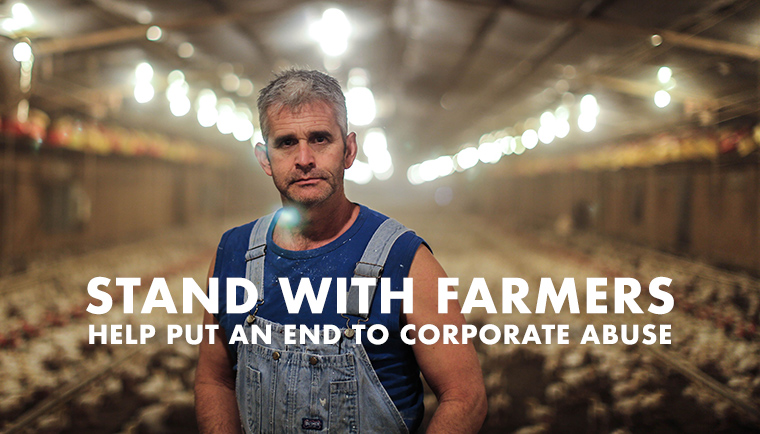
Stand with Farm Families
The people who grow our food deserve to make a fair living. But that’s out of reach for the livestock and poultry farmers who work in an industry where the power of a few giant corporations leaves them trapped in a rigged marketplace, vulnerable to abusive business practices.
In 2015 Congress allowed the USDA to move forward with groundbreaking rules protecting farmers in the livestock industry and in 2016, USDA officially announced the “Farmer Fair Practice Rules” providing basic protections for livestock producers and poultry growers. The Trump Administration’s first year offered a devastating blowback to the progress made over the last decade. Under new leadership by Secretary Sonny Perdue, USDA began to delay various aspects of the Farmer Fair Practices Rules and gutted the agency charged with their enforcement, the Grain Inspection and Packers & Stockyards Administration (GIPSA).
Stand with Farmers Petition:
In the May 2019, the USDA announced its intent to formulate a rule specifying criteria in determining whether conduct by meatpackers, swine contractors or live poultry dealers constitutes an “undue or unreasonable preference or advantage” afforded to some farmers, and not others, in violation of the law. Farm Aid worked in partnership with RAFI-USA, Organization for Competitive Markets (OCM), and the Government Accountability Project (GAP) and activated its audience to stand by farmers and push for four strong safeguards that would give farmers a fighting chance against corporate power. Aimed at protecting basic rights for livestock and poultry farmers that most of Americans take for granted – rights like the freedom of speech and the freedom to join together in association – we demanded that:
- Freedom to speak the truth. The rule must ensure that farmers are not financially punished or otherwise disadvantaged in the market for making public statements, especially to government officials or the media.
- Freedom to join together in producer associations. Poultry companies should not be allowed to discriminate against growers for joining together with other growers to advocate on their own behalf.
- Protection from corporations enforcing a self-serving system. Farmers’ pay should be based solely on things within their control. Differences in pay based on inputs provided by the corporation should be considered undue preference.
- Clear criteria with detailed, specific rules that adequately cover different types of livestock, and are suitable for the future. One set of criteria is not adequate to protect farmers from undue prejudice across all livestock sectors. Specific criteria must be established for all sectors of livestock, such as poultry, hog, and cattle.
Over the next several months, Farm Aid activated thousands of individuals in the call to stand with farmers, including at the Farm Aid 2019 festival in East Troy, Wisconsin.
Farmer Fly-In:
In mid-July, we funded a farmer fly-in, organized by RAFI-USA, GAP and OCM, where family farmers and ranchers from across the Midwest and Southeast spoke at a press conference at the National Press Club and met directly with members of Congress to explain what they have faced and why they need a strong rule in place.
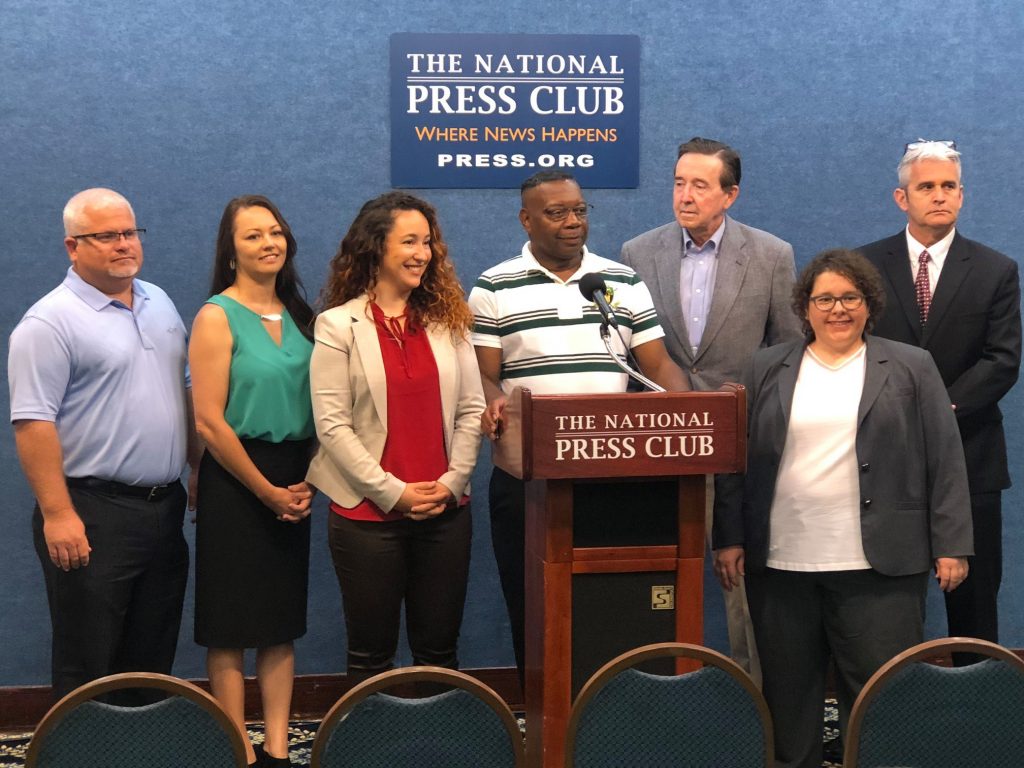
Tony Grigsby, Sally Lee (RAFI-USA), Carlton Sanders, Al Davis, Amanda Hitt (Food Integrity Campaign), Craig Watts. Photo by RAFI-USA.
Petition Delivery:
In October, RAFI-USA, National Sustainable Agriculture Coalition (NSAC), GAP, OCM and Farm Aid together delivered more than 84,000 signatures to the USDA from people demanding strong action to protect farmers’ rights.
Related Press:
- How a Top Chicken Company Cut Off Black Farmers, One by One. ProPublica. June 26.
- Family Farmers Go to Washington, Cry Foul Over Meat Industry Abuse Press Release
- Thousands urge USDA to act on GIPSA rule. Feedstuffs. October 11.
Booker Merger Moratorium
In April, Farm Aid joined 213 organizations in endorsing the Food and Agribusiness Merger Moratorium and Antitrust Review Act of 2019 (S. 1596/H.R. 2933). Like its 2018 counterpart, the legislation would impose an 18-month moratorium on the mega-mergers that have swept the agribusiness, food manufacturing and grocery industries. This wave of consolidation has contributed to falling farm prices, declining farm incomes, stagnant wages for food workers, raising food prices and economic stagnation in rural communities. The bill would also establish a commission to study the impacts of consolidation in the food and agricultural sectors and recommend any necessary changes to federal antitrust statutes or other laws and regulations to restore a fair and competitive agricultural marketplace.
#FairCattleMarkets Rally
In October, Farm Aid sponsored a farmer/rancher rally held in Omaha, Nebraska, the rally asked Secretary Sonny Perdue and President Trump to take steps to ensure fair livestock markets, including stopping foreign meat from being labeled “Product of U.S.A.”, ensuring that Country of Origin Labeling (COOL) is included in the United States Mexico Canada Agreement (USMCA) and restoring producer protection safeguards under the Packers and Stockyards Act (PSA) by issuing new rules.
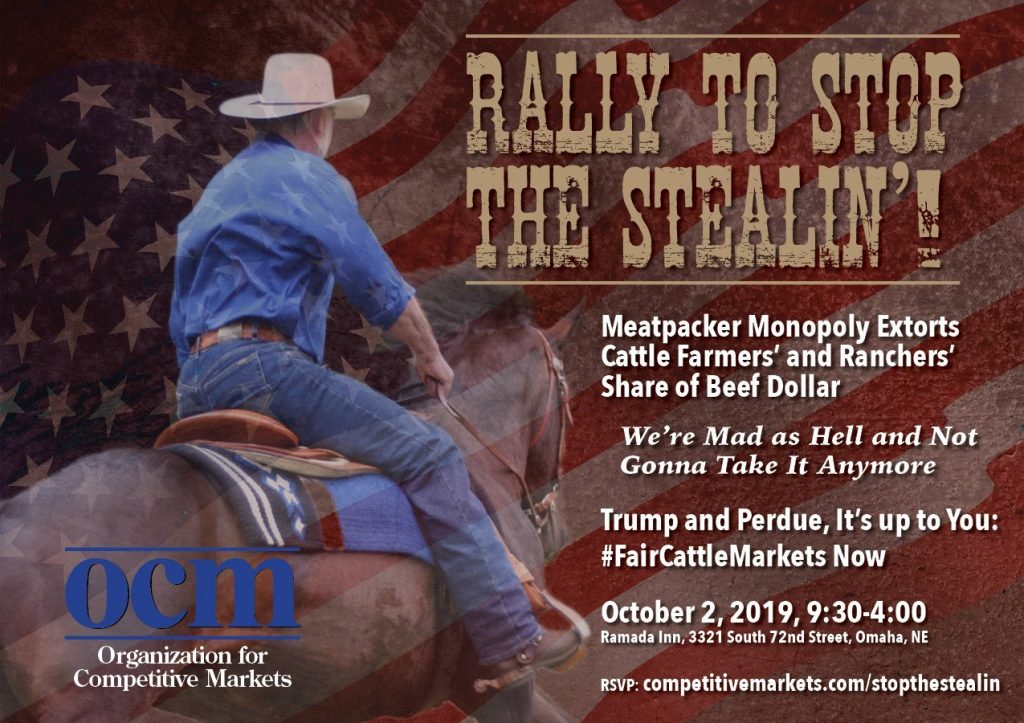
The rally was sponsored by Organization for Competitive Markets, R-CALF USA, Family Farm Action, Farm Aid, National Family Farm Coalition, American Grassfed Association, Open Markets Institute, National Dairy Producers Organization, Center for Rural Affairs, Nebraska Women Involved in Farm Economics, Independent Cattlemen of Nebraska, Nebraska Grange, Alabama Contract Poultry Growers Association, Wisconsin Farmers Union, Illinois Farmers Union, Iowa Citizens for Community Improvement, Iowa Citizens Action Network, Iowa Alliance for Responsible Agriculture, Kansas Cattlemen’s Association, South Dakota Stockgrowers Association, Colorado Independent Cattlemen Association, California Dairy Campaign, and California Farmers Union.
Dairy Crisis
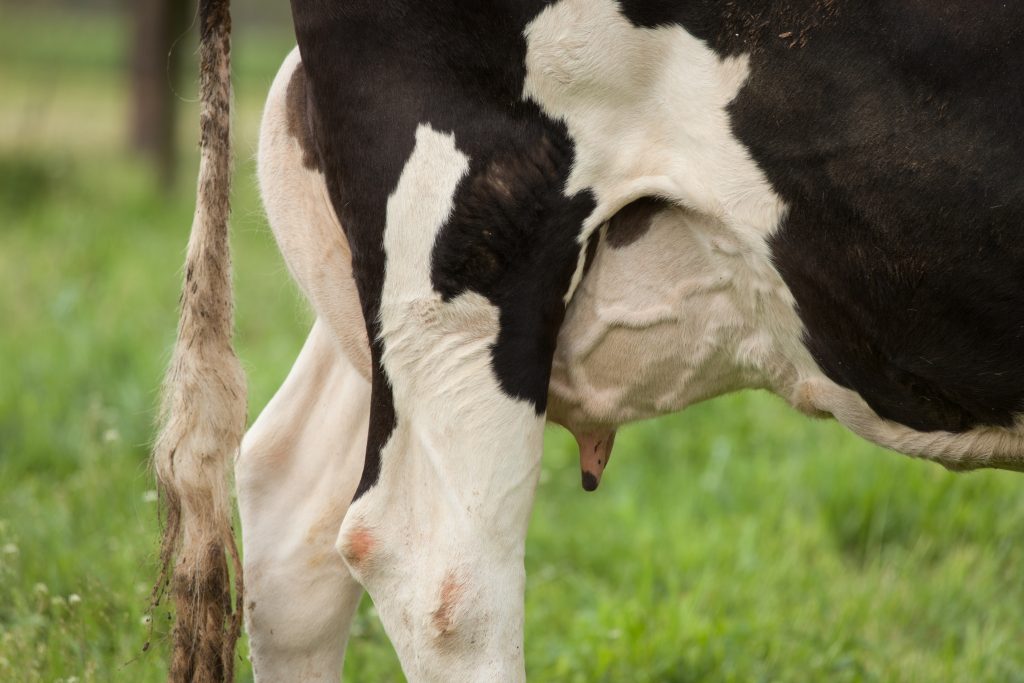
Photo © Patty O’Brien
Issue Communications
Farm Aid 2019 Festival:
The backdrop for Farm Aid 2019 was the farm economy and the resulting crisis farmers face, particularly in the festival’s host state of Wisconsin. But at our press event before the festival kicked off, we wanted to look at the crisis in a different way—from a place of strength and determination. The press event highlighted farmers and farm advocates that help us understand how—despite challenges and uncertainties—so many farm families have stayed on the land for generations and continue to see a future in agriculture. Among the stories told from the press event that kicked off the festival day was a video (seen below) showcasing Dairy Together, a group of dairy farmers in Wisconsin organizing farmers from across the country to present solutions to today’s dairy crisis.
Earned Media:
Notable interviews and press mentions regarding Farm Aid and the dairy crisis included:
- Dairyland in distress: Dairy farmers are in crisis — and it could change Wisconsin forever Year-long series run by Milwaukee Journal Sentinel
- Farm Aid 2019 coming to Alpine Valley Music Theatre, raising awareness of Wisconsin’s dairy farm crisis. Milwaukee Journal Sentinel. July 9.
- Wisconsin dairy crisis focus of Farm Aid 2019 Milwaukee Journal Sentinel September 21.
- Farm Aid to bring attention to dairy industry crisis in Wisconsin. WKOW.com. July 9.
Get Big or Get Out 2.0:
Just a week after the Farm Aid 2019 festival concluded, Secretary of Agriculture Sonny Perdue remarked at the World Dairy Expo in Madison, WI that: “In America, the big get bigger and the small go out.” In October, Farm Aid published a blog post in response, Dear Secretary Perdue: We’re better than big, tying his comments to a long history of government indifference to the loss of family farms. In addition, it clarified that today’s dairy crisis, much as farm crises of the past, are neither inevitable nor the fault of individual farmers. They are driven by policy written by and for corporate players desiring expanded market power.
Dairy Together
In 2018, Farm Aid supported Wisconsin Farmers Union as they organized a burgeoning effort titled Dairy Together, kicking off with a bus trip to Albany, NY, to an open meeting held by Agri-Mark dairy cooperative to review plans to address the dairy price crisis. Farm Aid supports Dairy Together’s continued efforts to push for federal policy that balances milk supply with profitable demand, as well as emergency measures to help farmers weather the current dairy price crisis and market-based solutions to achieve higher prices. In November, Farm Aid’s Farmer Leadership Fund supported two dairy farmers to attend the National Milk Producers Federation annual meeting in New Orleans in order to lift up the need for supply management policies at the event. The farmers utilized the opportunity to ask pointed questions to dairy industry leadership in Town Hall sessions and to push for movement on supply management, which received a general roar of support from the crowd.
Farm to School
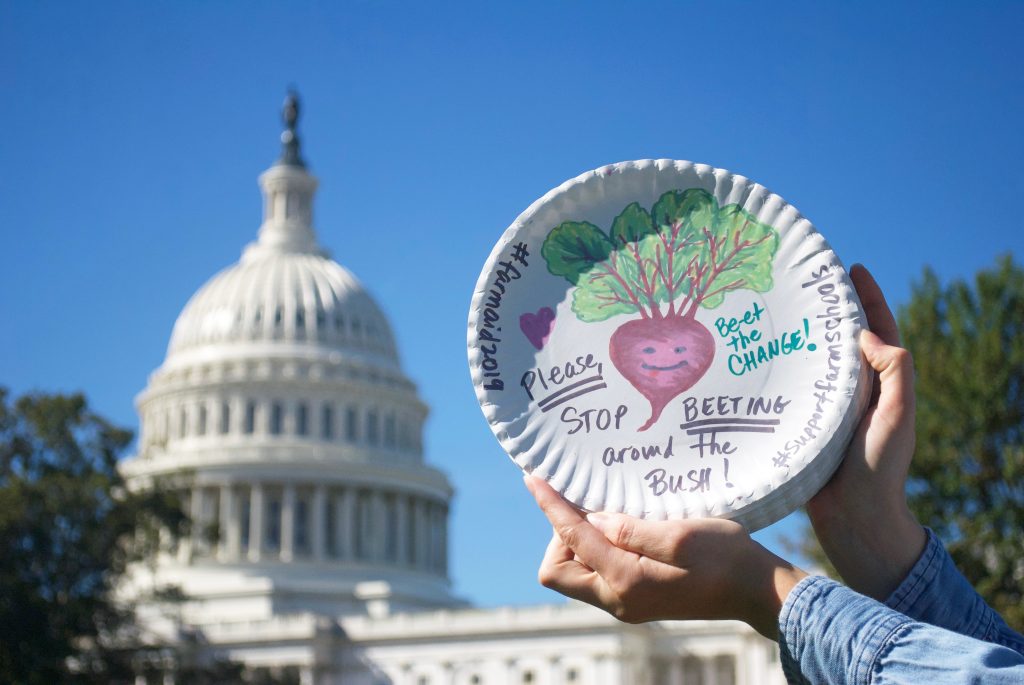
Paper plates designed by Farm Aid 2019 festivalgoers delivered to Congress in October 2019. Photo: NSAC
Farm to School Rocks! Petition
The prospect of a new Child Nutrition Act Reauthorization (CNR) created a major opportunity to ensure that every child has access to local, farm-fresh food and innovative farm to school programs all across the country. Farm Aid rallied our audience around a petition to support The Farm to School Act of 2019 and the Kids Eat Local Act, which offer Congress a blueprint for supporting farm to school in the next CNR and to engage beginning, veteran, and socially disadvantaged farmers in these programs.
Take Action with Farm Aid at Farm Aid 2019
Our Take Action with Farm Aid booth at Farm Aid 2019 invited festivalgoers to draw their favorite healthy school lunch on paper plates to show Congress how important it is to invest in farm to school programs. We joined forces with National Sustainable Agriculture Coalition, who delivered the paper plates to Senator Pat Roberts (R-KS), Chair of the Senate Agriculture Committee in mid-October.
Movement-Building Gatherings
Forward from Here
On the Thursday preceding Farm Aid 2019, Farm Aid hosted Forward From Here, in Lake Geneva, Wisconsin, gathering 140 farmers, organizational leaders, tribal leaders, and other movement builders to inspire solidarity across communities. Forward From Here highlighted how extremism in the U.S. has attempted to undercut movements from the countryside that are rooted in social, economic, and racial justice and committed to an enduring vision of a just country.
“When a target is put on the back of people because of their race, or their religion, or where they’re from, then we’re going stand with them, because we want to work with them. And if we don’t stand with them, why are they going to work with us?…The power that we’re building is part of something even bigger. Because the change that’s needed, the power that’s needed to make that change is more than what we can muster as an organization or…as a farm movement.
We need each other across those divisions.”
~ Mark Schultz, Land Stewardship Project
Forward From Here began with the voices of the first farmers of the land – Native American leaders from across the Great Lakes region, who shared stories their communities’ relationships to land, agriculture and food, and their work around food sovereignty, pipeline battles, native treaty rights, the impact of CAFO production on their waterways and more. Through sharing stories, participated were offered a unique opportunity to explore how various efforts to build power by people from Native American nations, rural communities or urban neighborhoods are connected and to inspire solidarity moving forward. Speakers included:
Andy Thundercloud, Ho-Chunk Nation elder
Reverend David L. Ostendorf, United Church Of Christ Minister
Ernie L. Stevens III, Oneida Nation
Jerry Volenec, Wisconsin dairy farmer
Laura Manthe, Oneida Nation
Mark Schultz, Land Stewardship Project
Michael J. Isham, Jr., Great Lakes Indian Fish & Wildlife Commission
Mike Wiggins Jr., Bad River Band Of Lake Superior Chippewa Indians
Dr. Monica M. White, University Of Wisconsin-Madison
Tom Hartz, Mayor of Lake Geneva
Sara Drescher, Forest County Potawatomi Community
Sarah Lloyd, Wisconsin Farmers Union / Dairy Together
Sydney Colwell, Ho-Chunk Nation
Tom Mosgaller, Grass-Fed Beef Farmer
Venice Williams, Alice’s Garden Urban Farm
Dr. Arthur C. Evans, Jr., American Psychological Association
Participant Reflections
“The biggest thing I took away from this event was that the Family Farmer and the Tribal people have a lot in common – the reverence for the land, the want to pass on the land and its resources to future generations and that the Corporate Farms are our common enemy!”
“It furthered our national discussion of racial equity in the food system in very concrete terms, both through the two keynotes and the excellent panels.”
“Farm Aid has encouraged me to become an organizer again, to push my comfort zone, to spend time building allies and long term plans.”
“…This event really drove home how much we’ve been overlooking the need to build bridges and work toward racial justice. I also think it’s so valuable to bring those farm and rural advocate groups all together. As I told a colleague, ‘I think you could do more networking in one day here than I’ve had time to do in the past year.’ Incredibly important!”
Collaboratives & Coalitions
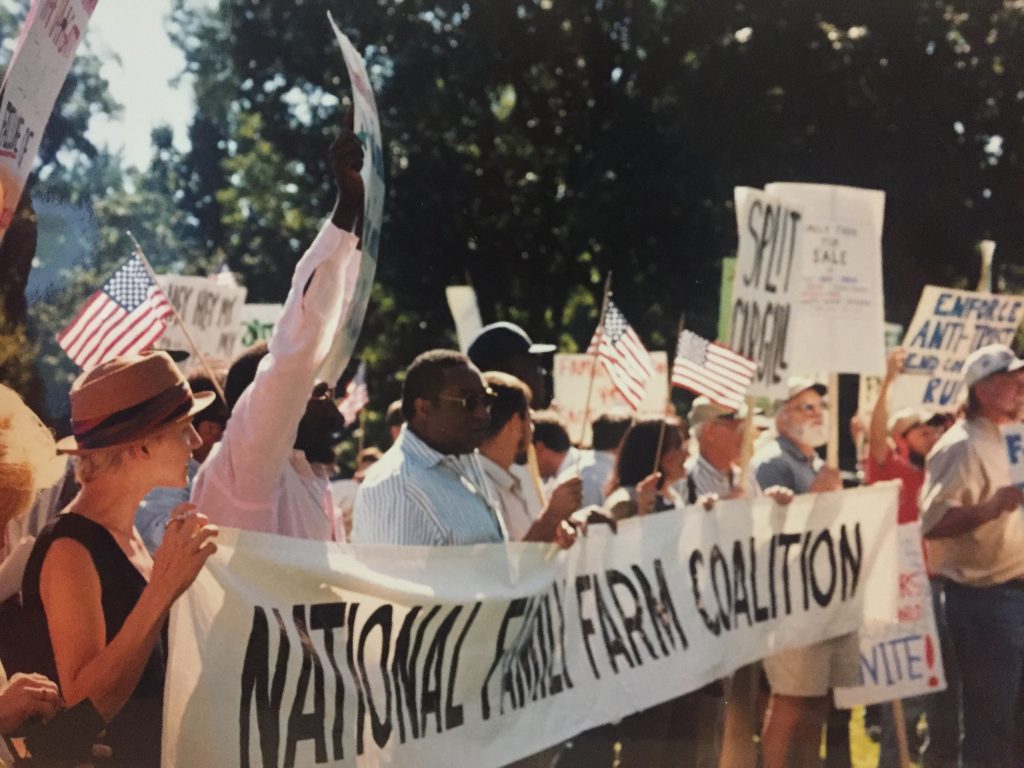
The 2000 Rally for Rural America brought 3,000 farmers to Washington, DC.
Campaign for Contract Agriculture Reform (CCAR)
CCAR is a coalition of farmer and consumer organizations with shared concerns about the trends and effects of vertical integration on farmers and consumers. An essential part of CCAR’s work is to advocate for the establishment of fair contracting standards for livestock and poultry contracts to ensure that the integrator-producer relationship is a fair partnership, rather than a dictatorship. CCAR member organizations are Contract Poultry Growers Association of the Virginias, Government Accountability Project, Farm Aid, National Farmers Union, Food & Water Watch, NSAC, R-CALF USA, and RAFI-USA. The coalition’s major work in 2019 included:
- Supporting the Booker-Pocan moratorium bill on mega-mergers in the food and agribusiness sectors.
- Coordinating a letter led by Senator Tester and Representative Kaptur to the USDA on the PSA undue preference rule.
- Sending detailed recommendations for the undue and unreasonable preference rulemaking to AMS Packer and Stockyard program staff.
- Advocating for the reform of the Small Business Association (SBA) guaranteed loans program by stopping the steady flow of taxpayer dollars that prop up the contract poultry system through.
Seeds and Breeds for the 21st Century
This national network of non-profit, public, and private researchers, advocacy organizations, agricultural businesses, seed companies and individual farmers advocates for policies that support and advance classical public breeding research programs and germplasm infrastructure in order to protect agricultural genetic diversity and address long-term challenges like climate change and global food security.
Dairy Together
Dairy Together is a farmer-led movement pushing for federal policy that balances milk supply with profitable demand. This coalition is building power in the policy and market arenas by creating a durable coalition of farmers, farm organizations, allied consumer and environmental organizations, and supply chain partners. Members include Wisconsin Farmers Union, California Dairy Campaign, California Farmers Union, Farm Aid, Michigan Farmers Union, Pennsylvania Farmers Union, National Farmers Union, and National Farmers Organization. A cornerstone of Dairy Together’s work is advocating for a federal supply management program that:
- Provides a fair price
- Reduces price volatility
- Addresses overproduction
- Discourages consolidation
- Allows for beginning farmer entry
- Is National and Mandatory
- Addresses import and export issues and informs smart trade policy
- Has meaningful farmer input in development, implementation, and governance
2019 Sign-Ons
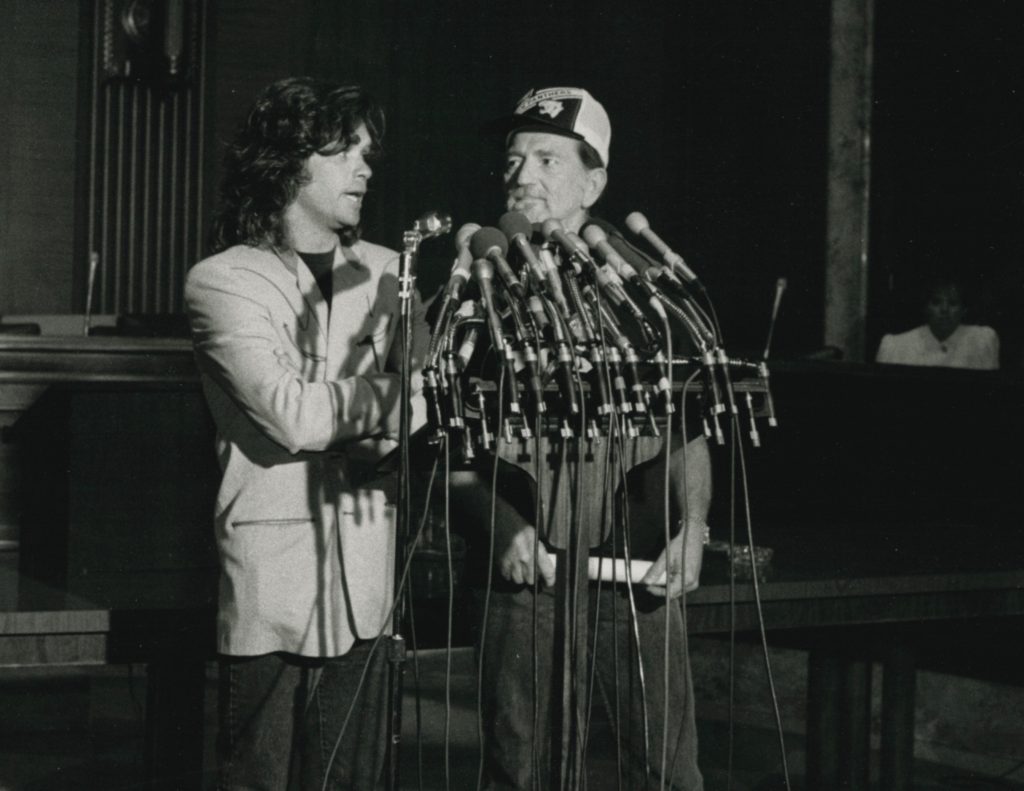
John Mellencamp and Willie Nelson in 1987.
January
- Endorsed the Buy American Agriculture Act, which requires that, whenever possible, purchases of agricultural commodities by the USDA must be from domestically owned enterprises. USDA would also be required to publish the rationale for awarding the purchasing contracts and whether those enterprises are domestically owned.
- Letter to the Iowa General Assembly supporting a moratorium on new and expanded factory farms in Iowa.
March
- Written Comments to the 2018 Farm Bill Implementation Listening Session regarding Farm Services Agency programs.
- Letter to USDA’s Food & Nutrition Service, joined by 374 organizations from 47 states and D.C., demanding functional, no-cost, wireless EBT processing machines for SNAP-authorized markets across the country.
- Letter to the Senate and House Agriculture Appropriations Committees supporting full funding for the Farm and Ranch Stress Assistance Network (FRSAN) in FY2020 Appropriations.
- Letter to the Agriculture Appropriations Subcommittees requesting $5 million for the state Agricultural Mediation Programs for FY2020.
- Letter to support Michigan Senate Bill 247 and House Bill 4418 to ban the disposing of manure, fertilizer, and waste from livestock operations on frozen or snow-covered soil (the “Sno-Fro Ban”).
April
- Letter to USDA Secretary Sonny Perdue requesting implementation of an Origin of Livestock Final Rule in 2019.
- Letter to Senate and House Agriculture Appropriations Committees requesting funding to implement the Office of Urban Agriculture and associated programing authorized by the 2018 Farm Bill, and funding for an urban agriculture follow-on study to the 2017 Census of Agriculture.
- Written Statement on FY 2020 Appropriations Requests on behalf of the Seeds and Breeds for the 21stCentury Coalition
May
- Letter endorsing Senator Booker and Rep. Pocan, the Food and Agribusiness Merger Moratorium and Antitrust Review Act of 2019 (S. 1596/H.R. 2933)
June
- Letter to the USDA National Organic Program requesting clarity on whether all farms are required to be held to the same standards regarding a 3-year transition from the last use of a prohibited substance.
- Letter to the Senate Appropriations Committee requesting the rejection of funding cuts and rejecting the expenditure of funds to relocate the USDA’s National Institute of Food and Agriculture (NIFA) and Economic Research Service (ERS) outside the hub of science and statistical agencies located in the National Capital Region (NCR).
July
- Letter to the USDA Undersecretary urging that any draft rule regarding the prohibition of meatpackers, swine contractors and poultry companies from providing “undue or unreasonable preferences or advantages” to any grower prioritizes the rights of America’s small independent cattlemen, hog producers, and contract poultry growers.
August
- Letter endorsing The Climate Stewardship Act of 2019, which makes a serious investment in farmers, ranchers, and rural communities as part of the solution to climate change.
September
- Follow-up letter to the USDA Food and Nutrition Service (FNS) in response to USDA solicitation to provide SNAP support to farmers markets and direct marketing farmers.
- Letter to USDA Secretary Perdue urging that all forms of genetic engineering should remain excluded methods under the National Organic Program
- Letter opposing expansion of manure-to-energy (“biogas”) schemes and calling for a clean energy future that does not involve the expansion of hydro-fracking and factory farms.
October
- Endorsed the Seeding Rural Resilience Act, which aims to curb the rising rate of farmer suicides in America.
November
- Letter to USDA Secretary Perdue in support of the proposed Origin of Livestock Rule in order to maintain a level playing field to all organic dairy producers, and uphold strong organic integrity for all organic farmers.
December
- Letter to Senators Rounds and Thune urging them to amend S.2744, The U.S. Beef Integrity Act, so it will correct the current misuse of the “Product of USA” label on imported beef products within a comprehensive mandatory country-of-origin labeling (COOL) bill.
- Joint comments on the Draft 2020 Michigan NPDES General Permit for Concentrated Animal Feeding Operations.
- Letter in support of supply management policies, alongside National Family Farm Coalition and the Coalition for Family Farms and the Environment.

